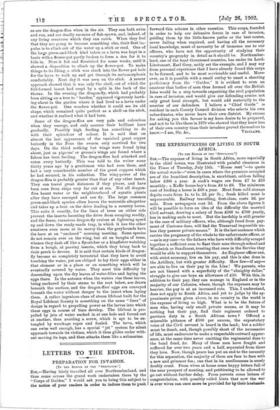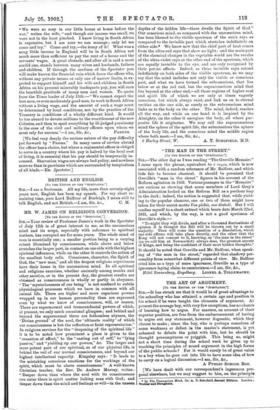THE EXPENSIVENESS OF LIVING IN SOUTH AFRICA.
[To THE EDITOR OP THE "SPECTATOR."]
Sin,—The expense of living in South Africa, more especially in the chief towns, was illustrated with painful clearness in the Times of Tuesday, July 15th. " House rent "—to quote the actual words—" even in cases where the premises occupied are of the humblest description, is exorbitant, seldom falling below £300 a year. A cook's wages are from £7 to £10 monthly ; a Kaffir house-boy's from £4 to £6. The minimum cost of feeding a horse is £60 a year. Meat from cold storage depots costs from ls. to ls. 2d. per lb. ; fresh killed meat is unprocurable. Railway travelling, first-class, costs 3d. per mile. Even newspapers cost 3d. From the above figures it will be possible to form an idea of the difficulty the married Civil servant, drawing a salary of from £500 to £700 yearly, has in making ends to meet. But the hardship is still greater in the case of military officers, who, although freed from pay- ment of Customs dues, will find the Transvaal impossible un- less they possess private means." It is the last sentence which carries the pregnancy of the whole to the unfortunate officer, or —as in my case—to the fathers who have with difficulty scraped together a sufficient sum to float their sons through school and Woolwich or Sandhurst, trusting that once in the Service they would be able to support themselves. An Engineer officer can, with strict economy, live on his pay, and this is also done in the Artillery, but with greater difficulty. How few—if any— are able to live on their 'pay in the Line ! We parents, who are not blessed with a superfluity of the "almighty dollar," struggle to give our boys an allowance of 250. With this, in addition to their pay, they can manage in England or in the majority of our Colonies, where, though the expenses may be heavier, the pay is at an increased rate. This, I understand, does not apply to South Africa, and yet to judge by the ap- proximate prices given above, in no country in the world is the expense of living so high. What is to be the future of men who, having only small private means, or it may be nothing but their pay, find their regiment ordered to garrison duty in a South African town P Offered a miserable pittance of £500 per annum, the expostulary voice of the Civil servant is heard in the land; but a soldier must be dumb, and, though possibly short of the necessaries of life, must endeavour to make a respectable outward appear- ance, at the same time never omitting the regimental dues to the band fund, &c. Many of these men have fought and suffered for over two years and a half, separated from those they love. Now, though peace has put an end to the necessity for this separation, the majority of them are face to face with a new and grimmer foe ; one that in its needlessness is surely doubly cruel. From wives at home oome happy letters full of the near prospect of meeting, and petitioning to be allowed to go out without further delay. From parents come letters of congratulation, with possibly veiled hints that now the war is over wives can once more be provided for by their-husbands.
" We were so cosy in our little house at home before the war," writes the wife, " and though our income was small, we were not in the least pinched. I know living in South Africa is expensive, but I am sure we can manage ; only let me come and try." Come and try,—the irony of it! What was a snug little income in England will be in South Africa not much more than sufficient to pay the rent of a house and the servants' wages. A great obstacle, and after all is said a most sordid one, stands between many wives and husbands, fathers and children. If through the medium of the Spectator you will make known the financial ruin which faces the officer who, without any private means or only one of narrow limits, is ex- pected to support himself and his wife and children in South Africa on his present miserably inadequate pay, you will earn the heartfelt gratitude of many men and women. To quote from the Times leader of July 15th :—" We cannot expect the best men, or even moderately good men, to work in South Africa without a living wage, and the amount of such a wage must be determined by local conditions, not by the practice of the Treasury in conditions of a wholly different kind. It would be too absurd to devote millions to the resettlement of the new Colonies, and then to spoil everything by ill-judged parsimony in the case of the civil and military officers upon whom we
must rely for success."—I am, Sir, &c., PARENS.
[We feel very deeply the serious nature of the pay difficulty put forward by " Parens." In many cases of service abroad the officer has a choice, but where a regimental officer is obliged to serve in a country where his pay is halved by the local cost of living, it is essential that his pay should be temporarily in- creased. Starvation wages are always bad policy, and nowhere more so than in garrisons which are surrounded by temptations of all kinds.—En. Spectator.]







































 Previous page
Previous page